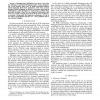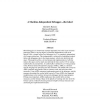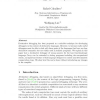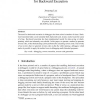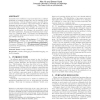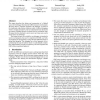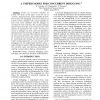151
click to vote
AMAST
2010
Springer
14 years 9 months ago
2010
Springer
Abstract. We present a declarative debugger for Maude specifications that allows to debug wrong answers (a wrong result is obtained) and missing answers (a correct but incomplete r...
100
click to vote
ASPDAC
2010
ACM
15 years 3 days ago
2010
ACM
Managing long verification error traces is one of the key challenges of automated debugging engines. Today, debuggers rely on the iterative logic array to model sequential behavior...
113
click to vote
CORR
1999
Springer
15 years 1 months ago
1999
Springer
Most debuggers are notoriously machine-dependent, but some recent research prototypes achieve varying degrees of machine-independence with novel designs. Cdb, a simple source-leve...
119
click to vote
ENTCS
2002
15 years 1 months ago
2002
Declarative debugging has been proposed as a suitable technique for developing debuggers in the context of declarative languages. However, to become really useful debuggers must b...
ENTCS
2007
15 years 2 months ago
2007
The need for backward execution in debuggers has been raised a number of times. Backward execution helps a user naturally think backwards and, in turn, easily locate the cause of ...
111
click to vote
USENIX
1990
15 years 3 months ago
1990
Dbx is the standard source-level debugger on most Unix1 workstations. Over the past six years Dbx has grown from a debugger for interpreted Pascal programs to a debugger for compi...
136
click to vote
AADEBUG
2005
Springer
15 years 4 months ago
2005
Springer
Increased reuse of software components has led to a software mishmash as existing packages are used as building blocks for new systems. Current debuggers cannot cope with the intr...
147
click to vote
HASKELL
2007
ACM
15 years 6 months ago
2007
ACM
This paper describes the design and construction of a Haskell source-level debugger built into the GHCi interactive environment. We have taken a pragmatic approach: the debugger i...
108
click to vote
ICPP
1993
IEEE
15 years 6 months ago
1993
IEEE
: Events are occurrence instances of actions. The thesis of this paper is that the use of “actions”, instead of events, greatly simplifies the problem of concurrent debugging....
AADEBUG
1997
Springer
15 years 6 months ago
1997
Springer
This paper introduces the bisection debugging model. The key idea is to use a debugger to identify the semantic differences between two versions of the same program. The debugger ...

